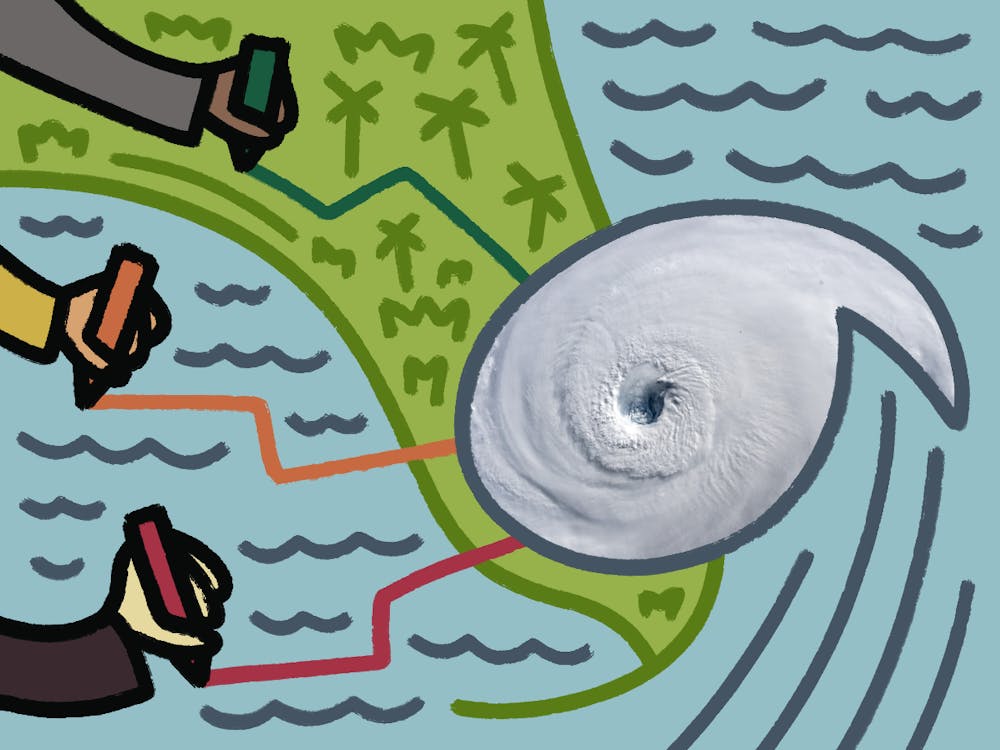In 2024, Sean Farrell’s family put up rain shutters, locked windows and doors, packed up their dogs and cat and drove to the Panhandle to ride out Hurricanes Helene and Milton. When they returned, they found no damage, save a couple of trees knocked down in the surrounding area.
Farrell, a 21-year-old UF statistics senior, said his family home in Sarasota, Florida, was directly in the hurricanes’ path of destruction.
He attributes his family’s safety to early warnings that told them to evacuate, he said.
He doesn’t know if he could say the same about this year because funding cuts on weather prediction programs can chip away at families’ preparation.
The Trump administration's "skinny budget," released by the White House May 2, proposed a 24% reduction in funding for the National Oceanic and Atmospheric Administration, the federal organization responsible for monitoring and forecasting weather events like hurricanes.
Predicting the risk of a hurricane begins with gathering data. Experts at NOAA’s National Hurricane Center examine satellite images, observe weather patterns and create computer models to forecast and warn emergency officials, media and the public about approaching hurricanes, tropical storms and tropical depressions.
With about 800 employees terminated since Feb. 28, NOAA faces understaffing, presenting the agency with critical challenges in finding staff necessary for accurately forecasting hurricanes, tornadoes and other extreme weather events.
Stephen Mulkey, a UF biology professor and environmental scientist, said storms are intensifying and making landfall farther north. He attributed it to extremely high sea surface temperatures.
“The temperature of the Gulf of Mexico over the last hurricane season in July and August was absolutely terrifying,” Mulkey said. “It was unbelievable.”
In 2024, the Gulf of Mexico had an ocean heat content of 89 kJ/cm², compared to an average of 74 kJ/cm² from 2013 through 2024. The estimate for 2025 is even higher, Mulkey said.
Ignoring, silencing and defunding climate monitoring and response only serves to worsen the situation, Mulkey said.
“The funding cuts will be devastating to the basic climate change program,” he said. “Urgent systemic changes are needed to avoid civilization-threatening consequences.”
Climate censorship worsens the situation, he added.
Mulkey said the National Science Foundation reprimanded him on three occasions for using the terms “climate change” or “sustainability” in grant abstracts and titles in 2017. He was encouraged to avoid them because the terms might have drawn negative attention from a Republican Congress, he said.
“The goal of this censorship is to continue to keep the public in the darkness as to how grave our situation is,” he said.
Melanie Schepmans, a Gainesville lead organizer of GenCLEO, the youth branch of the climate activist organization CLEO Institute, said heavy hurricane activity means Floridians need strong hurricane resources.
“NOAA data shows us that the past nine consecutive hurricane seasons had above-average activity,” Schepmans said. “These cuts affect the lives of all Americans, but especially Floridians, whose lives depend on that fast, reliable and accurate hurricane forecasting that’s only possible through the resources that a government agency such as NOAA has.”
The CLEO Institute relies on weather-related emergency broadcasting and federal agencies like NOAA to help provide aid to hurricane victims, she said. The organization forwards awareness campaigns to remind residents of evacuation routes and shelters.
Gainesville Interim Emergency Manager Alvin Jones said federal cuts have directly impacted the city’s hurricane services.
“We lost funding that we relied on heavily for our specialty teams,” Jones wrote in an email.
The city is working to fill gaps with support from Gainesville Fire Rescue and a collaboration with Alachua County Emergency Management, he added.
The city released its 2025 Gainesville Hurricane Season Brochure, which includes emergency response numbers, hurricane shelter locations and preparation advice. The brochure advises residents to rely on NOAA organizations like the National Weather Service and the National Hurricane Center to stay informed before, during and after a storm. Such organizations are facing budget cuts and have had access to key monitoring satellites revoked.
David Peaton, Alachua County’s assistant director of emergency preparedness, said the county’s hurricane response will remain consistent regardless of federal changes.
“No matter what happens, we still have the same responsibility, and that’s to keep our community safe and get people’s lives back to normal as quickly as possible [after a storm],” Peaton said. “Nothing is changing the way we are going to respond to our community.”
Alachua County frequently uses the National Weather Service in Jacksonville to help with hurricane response, and despite looming uncertainty, Peaton said the organization still provides the county a “top-notch service.”
He hopes the county can continue to rely on the NWS for critical storm information for hurricanes and other extreme weather events, he said.
Kirsten Chaney, a meteorologist for the NWS Jacksonville location, said residents need to take hurricane preparation seriously, especially as North Florida faces an above-average hurricane season.
“We are in what’s called an endzone neutral year, and that is going to allow storms to form without any disruption,” Chaney said. Because of reduced wind shear, which can prevent hurricane formation, “if [storms] start going, they can keep going.”
Still, she said, high activity doesn’t guarantee landfall will occur.
Chaney said the NWS Jacksonville branch will remain in close contact with its local partners in Florida and Georgia.
“We work very closely with our emergency managers, fire, police and essentially everyone that's making decisions for public safety,” she said. “If there is a potential storm out there, we will be providing weather briefings to what we call our core partners – the emergency manager community and [local] decision-makers.”
She feels confident the NWS will continue to provide critical support throughout the 2025 hurricane season, she said.
“We are provided with a bunch of tools that we are confident going into this hurricane season [with],” she said. “We will always provide service that helps to protect lives and property in our forecast area.”
NOAA communications specialist Marissa Anderson said the NWS “continues to meet its core missions amid recent reorganization efforts” in a written statement.
The NWS is assigning temporary duties to remaining employees to fill critical positions at field offices, she wrote. NOAA will open “a targeted number of permanent, mission-critical field positions” exempted from hiring freezes in the Department of Commerce, Anderson said.
Contact Koushin Unber and Avery Parker at kunber@alligator.org and aparker@alligator.org. Follow them on X at @KUnber27 and @AveryParke98398.
Avery Parker is an English and History senior and the Spring 2026 El Caimán editor for The Alligator. He previously worked as The Alligator's University desk editor, as well as a reporter for the University and Enterprise desks. He doesn't know the meaning of the word "freetime," but he can usually be found deep in an archive reading 19th century documents or tending to his four cats.






